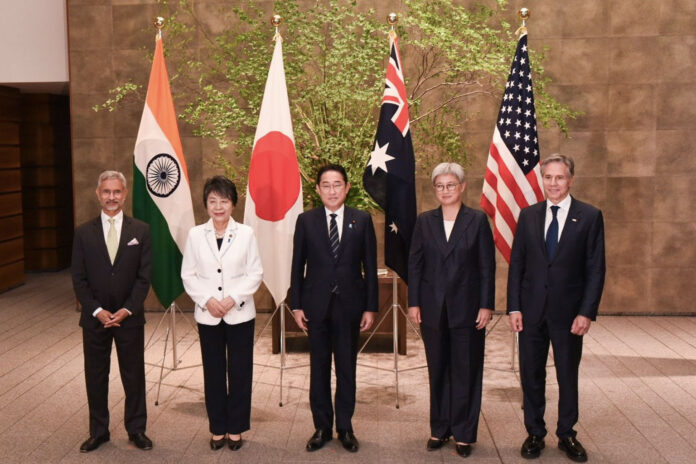Indian External Affairs Minister (EAM) S. Jaishankar advocated for the Quad — the Quadrilateral grouping of India, U.S., Australia and Japan — today as an essential mechanism for ensuring that Indo-Pacific maritime geography remains free and open.
In his opening remarks, at the Quad Foreign Ministers meeting in Tokyo today, the EAM said, “As political democracies, pluralistic societies and market economies, there is the key question of upholding a rules-based order. It is only our collaboration that can ensure that the Indo-Pacific remains free, remains open, stable, secure and prosperous.”
Since 2019, the Quad foreign ministers have met annually to discuss and drive cooperation on key regional strategic challenges. They last met on the margins of the UN General Assembly in New York last September. The Quad has increasingly been seen as a counterbalance to a rising China in the Indo-Pacific.
The fact that it is taking 4 major countries, one of them a super power (U.S.) to come together to counter China, illustrates just how big and fast China’s rise has been in international geopolitics and geoeconomics.
The Quad members have long maintained that the grouping is not aimed at any single country. However, China has described it as a “bloc” for confrontation, and one that falls under the “Cold War mentality”.
In the meeting on Monday, EAM Jaishankar highlighted the need for “transparent” digital partnerships and de-risking economic growth in the region, saying “a major challenge is to ensure global economic growth, while also de-risking it.” He added “Supply chains are a particular focus for resilience, just as we push for trusted and transparent digital partnerships…we are in the midst of a re-globalisation. At the same time, it is only our collective endeavours that can proof the international system against disruptions, man-made or natural.”
A joint statement was released after the meeting in which the Quad foreign ministers said that they were seriously concerned about intimidating and dangerous manoeuvres in the South China Sea and pledged to bolster maritime security in the region.
The meeting was attended by the 4 foreign ministers, namely Australia’s Penny Wong, India’s Subrahmanyam Jaishankar, Japan’s Yoko Kamikawa and Antony Blinken from the U.S.
The Quad group also said they were working on a series of initiatives to maintain “the free and open maritime order” including helping partners improve domain awareness via satellite data, training and capacity building. They also announced a plan to set up a new maritime legal dialogue.
In her remarks, Australia Foreign Minister Penny Wong highlighted the need for maritime cooperation and remarked that the Indo-Pacific should be a region where “no country dominates and no country is dominated”.
“Secretary Blinken underscored the importance of realising a just and enduring peace for Ukraine consistent with the UN Charter,” according to the US State Department.
While in a separate security talk between the U.S. and Japan on Sunday, the two treaty allies labelled China the “greatest strategic challenge” facing the region. The two foreign ministers said, “We are seriously concerned about the situation in the East and South China Seas and reiterate our strong opposition to any unilateral actions that seek to change the status quo by force or coercion,” without directly mentioning China.
Asked about this at a news briefing on Monday, the Chinese foreign ministry spokesperson Lin Jian said the Quad was “artificially creating tension, inciting confrontation and containing the development of other countries”.










